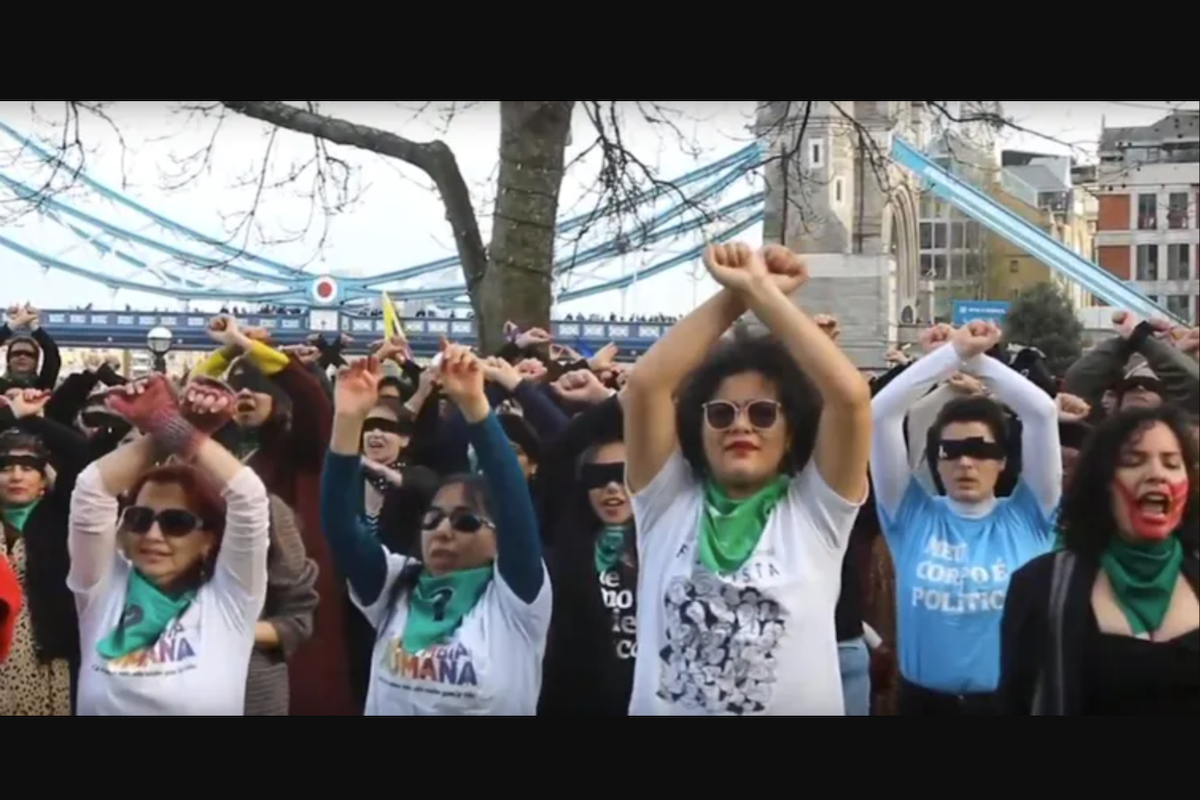

“A Rapist in Your Path,” sung next to Tower Bridge in London on December 7, 2019. (Las Tesis Londres)
By Athanasia Francis, University of Liverpool
A Chilean feminist anthem called “Un violador en tu camino” or “A Rapist in Your Path” that has gone viral worldwide reached London in early December.
Responding to a social media call by Latin American women living in the city, hundreds of feminist activists gathered on the south side of Tower Bridge on December 7. Wearing colorful clothes, black blindfolds and pañuelos —green scarves symbolizing the campaign for legal abortion— they sang and performed a choreography rich in political symbolism.
The song —also known as “The Rapist Is You” after one of its lyrics— was first performed in public on November 25 in Santiago, Chile by feminist group Las Tesis outside the country’s Supreme Court to mark the International Day for the Elimination of Violence Against Women.
Amid ongoing protests in Chile demanding social reforms, there has been widespread criticism by international human rights organizations over the extremely violent way in which protestors are being treated. Protesters have reported the use of kidnapping, torture, and sexual abuse against women in Chile. The use of sexual violence concerned almost 15% of all complaints made within the first 40 days of the protests, according to a report by the campaign organization Human Rights Watch. The Chilean state’s response became a major theme in the song.
The song rapidly crossed national borders. From Mexico to Greece, and from the Basque country to Kenya, it has become a global vehicle of feminist protest with local adaptations built around a solid lyrical core:
Patriarchy is a judge who judges us for being born
and our punishment is the violence you don’t see.
It’s femicide, impunity for my murderer,
it’s disappearance, it’s rape.
And it wasn’t my fault, where I was, or how I dressed.
The rapist is you, the rapist is you.
It’s the police, the judges, the state, the president.
The oppressive state is a macho rapist.
Powerful Symbolism
For protesters, the lyrics and choreography directly reflect their experiences. The pillars of institutional power —the police, the judges or political leaders— either turn a blind eye to sexual violence or become its perpetrators. During the performance, the blindfolded activists squat three times. According to Las Tesis, this alludes to the humiliating body position women are forced to assume when arrested in Chile, often stripped naked. Elsewhere, performers have pointed in the direction of the institution named each time, such as the police or the courts.
The performance is a visible, vocal public act. It is a direct contrast to the silencing of complaints about missing and violated women, often symbolized by a red hand print over a performer’s mouth. As Catalina Venegas, one of the organizers of the London event told me:
“The song is about the worse forms of gender violence: femicides, disappearances, rapes that are all difficult to trace because they are buried under a layer of silence. And silence, in all these cases, is the worst possible scenario you can imagine.”
Transnational Appeal
The popularity of the London event and the diverse crowd that attended it triggered an uncomfortable question: why was this song relevant to us all, Chileans, Latin Americans and others? The question of transnational connections, at the core of my own ongoing research, has persistently pointed towards the shared realities of violence as experienced by women and marginalized groups around the world.
I have attended feminist protests in several countries, both as a researcher and a feminist activist and survivor of sexual violence. The message I see in this song is alarmingly similar to what I’ve witnessed in other protests: “This is a war.”
Gendered violence is an international common denominator affecting our communities. I’ve heard from women in both the UK and Spain who feel they have to carry weapons to avoid being raped when going home alone, or who submit themselves to a form of curfew after dark for fear of gendered violence.


Kitty-knuckles and personal safety alarms attached to key rings that my research participants carry on them. (Photo by Athanasia Francis)
Failure to acknowledge where accountability lies leads to victim-blaming rather than addressing that violence against women is a complex, society-wide problem. For example, police in Suffolk, England, recently angered many when they decorated a community Christmas tree with messages advising women to avoid excessive drinking, walking alone late in order to stay safe at Christmas.
We are incredibly disappointed that despite our advice, our explanations into the repercussions of #VictimBlaming, @SuffolkPolice have decided to create this Christmas Tree. It is not our responsibility to keep ourselves safe! #AfterNightFail pic.twitter.com/tqXtDNPPhA
— ReclaimTheNightIpswich (@nightipsw) November 30, 2019
Justice systems in various countries seem to be equally complacent or misogynistic when dealing with this type of violence. The treatment of cases such as “The Wolfpack” or La Manada trial in Spain, where a semiconscious victim had to prove that she actively resisted her rape to qualify for justice, exposed the deeply ideological assumptions built into the country’s legal systems. In the end the attackers were convicted of sexual abuse, not rape.
This transnational feminist response in the form of a song proposes solidarity and empathy in turbulent political times. It’s calling for an acknowledgement of sexual violence as a systemic and global problem in democratic institutions that, ironically, were created to prevent it.
The version of the song performed in London ended with the phrase: “The state doesn’t support me, it’s my sisters that do.” This widespread political cry in the form of a poetic truth —too close to home for some of us —makes the call for change too hard to ignore.
This article is republished from The Conversation under a Creative Commons license. Read the original article.


